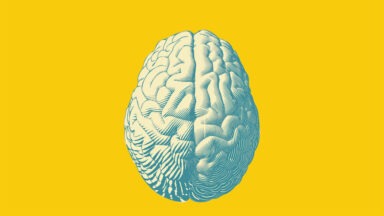New Gene Discovery May Explain Rapid Human Brain Evolution

A revealing new study on human evolution and brain development has just been published. Could this lend credence to the stoned ape theory of brain evolution?
About 300,000-800,000 years ago the human brain experienced a massive and accelerated growth spurt. Scientists have offered many explanations for how and why this may have occurred, but a new study out of Boston Children’s Hospital focused on a fast-evolving set of the human genome called human accelerated regions (HARS). Previous studies have found about 3,100 HARS during brain development, but the team at Children’s Hospital determined one HAR gene PPP1R17 could be responsible for or play a significant role in, rapid brain development. Further, they discovered this works differently in humans than in other animals.
Ben Stewart, the host of Gaia’s Limitless series, said,”[T]hese regions of the human DNA may hold some kind of an answer at the rapid explosion of human neo-cortex because if you think of it evolutionarily, there’s not been one creature, at least on planet Earth, that has been studied that had any organ increase in size as large and as rapidly as the human brain did, so there’s definitely some unanswered questions there.”
“I’m pretty sure that these HARS regions are being looked at for something very unique in the evolution of the brain, and my own personal twist on it is this also might be important when we start looking at brian-machine interfaces and how the brain can potentially cause mutations to adapt to some kind of technology in the brain to enhance or evolve the human brain,” Stewart said.
How could this new discovery be related to the Stoned Ape theory?
“There’s a possibility that the Stoned Ape theory could lead into this. Now, the Stoned Ape theory was really popularized by Terence McKenna,” Stewart said. “Over time, you would have some of our ancient ancestors, hominids, that would be following behind bovine creatures, cows, and in the cow patties in the fields that would naturally, having followed these creatures around for hundreds of thousands of years or whatever it might have been, that they would have started eating the mushrooms, the psilocybin mushrooms that grow naturally in cow patties. These experiences tickling the language centers and other parts of the brain, bringing down the rigidity of the default mode network, and activating other communication hubs within the brain, that could actually explain the rapid explosion of the human neocortex.”
“In this article, they’re saying that these human accelerated regions act differently in humans than they do in primates or creatures like mice and ferrets that they’ve looked into now. So, potentially if there is some connection with the Stoned Ape theory, that psychedelics or psychotropics helped in the expansion of the human neocortex, and made us as, at least psychologically, so much different than the rest of the creatures on Earth, then there may be something to look at here.”
The Sacred Uses of Psychedelics in Human History

So much has been written over the past several decades regarding the historical use of psychedelic plants and the way they’ve contributed to the evolution of our species. Scholars, writers, and scientists — including researcher Graham Hancock, psychologist Timothy Leary, and ethnobotanist Terence McKenna — have proposed our very evolution is inseparable from the use of psychotropics and the way they’ve shaped the human experience.
And now we welcome a new wave of psychedelic researchers, including author Tom Hatsis, who has deeply considered the ways in which certain plants may or may not have been depicted in ancient and sacred contexts.
Hatsis might be regarded as a man on a quest to prove nature’s plants have the power to bring growth and insight beyond ordinary sources of knowledge and information, but he is clear to distinguish between recreational and sacred use of them. He is also armed with plenty of research that aims to clear up misguided conclusions about the role of psychedelics in history, including their appearances throughout biblical works of art.




































